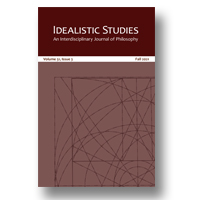|
|
|
1.
|
Idealistic Studies:
Volume >
53 >
Issue: 2
Emmanuel Chaput
Madness, Habit and the Genius:
On Hegel’s Theory of Embodiment
abstract |
view |
rights & permissions
| cited by
In this paper, I explore Hegel’s concept of freedom as self-liberation. I consider the struggle between the soul and the body within Hegel’s Anthropology as an example of how conflict can act as a condition for asserting one’s freedom through self-improvement or Bildung. In this regard, there are reminiscent aspects of the famous ‘Lordship and Bondage’ dialectic within Hegel’s treatment of the body-soul relation. If the initial dominion of nature over the soul can be described as madness for Hegel, habit constitutes the mean through which spirit acquires its freedom.
|
|
|
|
|
|
|
2.
|
Idealistic Studies:
Volume >
53 >
Issue: 2
Seyed Masoud Hosseini
Fichte’s Contribution to German Aesthetics
abstract |
view |
rights & permissions
| cited by
In aesthetics/philosophy of art, Fichte did not produce works as great as Kant’s Critique of the Power of Judgment or Hegel’s Lectures on Aesthetics. As a result, it was long believed that he had no role to play in the aesthetics of German idealism. Nevertheless, there are a few works in which we can identify the materials for developing an innovative philosophy of art. In this article, it is argued that Fichte takes two fundamental steps in aesthetics: 1) by transferring the weight of the discussion of aesthetics to the philosophy of artistic creation, he makes, as it were, a Copernican revolution in aesthetics and thus transforms the aesthetics of taste into a philosophy of art based on the creative spirit; 2) he raises the status of aesthetics (in fact, the aesthetic sense) to the level of “a (or the) condition for the possibility of philosophy.”
|
|
|
|
|
|
|
3.
|
Idealistic Studies:
Volume >
53 >
Issue: 2
Norman Schultz
The Fear of Relativism:
Dilthey’s Theory of Worldviews between Historicism and Ahistoricity
abstract |
view |
rights & permissions
| cited by
The central thesis of this article posits that Dilthey’s theory of worldviews initially leans towards historical relativism but ultimately reverts to an unsuccessful ahistorical solution involving the classification of universal types of worldviews. To substantiate this thesis, I will elucidate how Dilthey’s position emerged amidst the intellectual conflicts of materialism, Neo-Kantianism, and its relationship to historicism. Focusing on Dilthey’s seminal work, ‘The Types of Worldview’ (1911), I will explore how, in response to the constraints of his era and a prevailing fear of relativism, Dilthey ultimately adopts an ahistoricist approach, as exemplified in his brief exchange with Husserl. In conclusion, this article contends that Dilthey’s hermeneutics represents a partial foray into a genuinely historicist philosophy but falls short of fully justifying historical, objective knowledge.
|
|
|
|
|
|
|
4.
|
Idealistic Studies:
Volume >
53 >
Issue: 2
Ligeng Zhang
Does Truth Have Degrees? Bradley’s Doctrine of Degrees of Truth
abstract |
view |
rights & permissions
| cited by
What is the nature of truth? This question has been answered by philosophers in quite different ways, while F. H. Bradley asserts that truths have degrees and that no proposition can be stated to be simply true or false. In this paper, I briefly illustrate what he calls the doctrine of degrees of truth and try to address the problems it entails. I first explain what he means by truth and error/falsehood (he does not make a clear distinction between the two terms); then, I concentrate on his criticisms of three theories of truth, followed by a discussion of his own identity theory of truth. I will be focusing on his doctrine of the degrees of truth and highlight its difficulties. I show that his theory faces some insurmountable difficulties, and it should be motivated by a particular form of monism that he insisted on, saying existence monism.
|
|
|
|
